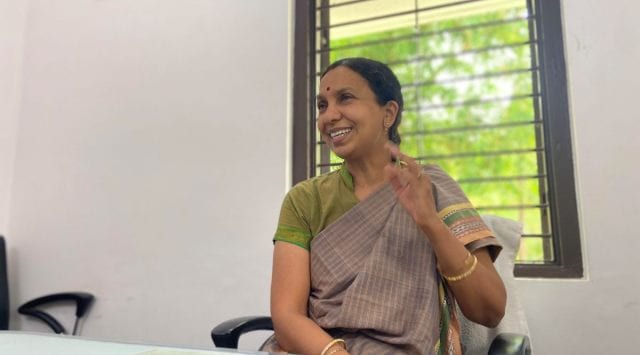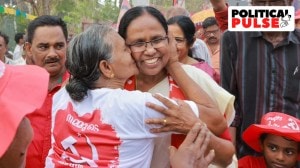- India
- International
Jayanti Ravi: ‘Second wave of Covid-19 hit suddenly, not much epidemic intelligence’
Jayanti Ravi says that Gujarat was among the first states to put in place a “normal treatment protocol” which was emulated by the centre and AIIMS.
 Jayanti Ravi is set to take charge as secretary of Auroville Foundation in Tamil Nadu. (Express)
Jayanti Ravi is set to take charge as secretary of Auroville Foundation in Tamil Nadu. (Express)While the Gujarat government was prepared to face the first wave of Covid-19, there was no “epidemic intelligence” about the second wave, says outgoing principal secretary, health and family welfare, Jayanti Ravi, who will join as secretary, Auroville Foundation in Tamil Nadu after a four-year stint in the health department.
In an exclusive interview to The Indian Express, Ravi says, “The second (wave) hit us all of a sudden and there was not much of an epidemic intelligence from any corner — not only from within Gujarat but nationally… and it was almost nine times of the curve (of the first wave, of daily new cases of Covid-19).”
As compared to that during the first wave Gujarat had some “lead time” and was ready with the 1,200-bed Ahmedabad civil hospital, although there was a problem of staff. “We had doctors and nurses but suddenly when the numbers go up, you need more nurses, you need more janitors also. We tried our best to get as many as we could but there were some areas where people were not willing to join because of the taboo and stigma related to Covid-19. It (Covid-19 management) had a lot of challenges but I think by and large we were able to handle it,” says Ravi.
The Gujarat High Court is hearing two suo motu petitions registered during the two waves, during which it issued stern directives to the government to put systems, data and policies in place. Ravi, on a directive from the court, filed affidavits on the management of the pandemic.
Asked why the death registrations were not being made public for the Covid-19 years, Ravi says, “That data will also be made available at the suitable time because right now it is not a normalcy kind of period. It is happening on a computerised platform, so there is no way that some deaths will go unreported, it’s just that it will take some time. Some may report it immediately, some after three months, some others after six months.”

Ravi says that Gujarat was among the first states to put in place a “normal treatment protocol” which was emulated by the centre and AIIMS.
She credits the Dhanvantri raths – the surveillance vehicles that were deployed first in Ahmedabad, an initiative of Chief Minister Vijay Rupani and the ayurvedic and homeopathic prophylaxis like Arsenium Album-30, ukalo, samshani vati. Says Ravi, “I know of villages after villages in many parts of Gujarat where the entire population was given this prophylactically and the village did not have a single case, such as in Porbandar (in Saurashtra), districts in north Gujarat.”
An achievement of Gujarat health department that Ravi is proud of is the continuous improvement in SDG ranking seen in the annual NITI Aayog report when it comes to SDG 3 – good health.
“When I joined the department, we had the SDG rankings declared and we were in the 17th rank in SDG 3 of good health. We felt a concerted effort was needed to improve maternal mortality, infant mortality, mortality of children under five years. This year, we ranked the first among all states, which is a huge achievement.”
Ravi specifies how the improvement has been gradual but upwards, with the 17th rank in SDG 3 in 2018-19, followed by the eighth rank in 2019-20 and now first rank in 2020-21.
Ravi joined as health commissioner in 2017 and was elevated as principal secretary in 2019.
As collector of Panchmahal district, Ravi says that the most “difficult and challenging” time was when the burning of the Sabarmati Express train took place on February 27, 2002. She was the first to enter the train after the fire that killed 59 passengers, mostly kar sevaks, was put out and has deposed before the Nanavati-Mehta Commission appointed by the Gujarat government and the Justice Banerjee Commission by the Centre. Ravi’s was a critical testimony on the how the decision of whom to hand over the bodies of those who died on the train, was taken. The Godhra incident sparked communal riots across the state in which over 1,200 were killed. Ravi, a masters in nuclear physics from Madras University and a masters in public administration from Harvard, is also trained in Carnatic and Hindustani classical music.
She says, she would “paint or draw” to unwind “after Godhra (the train burning)”. In 2004, Ravi went on her first deputation to the Centre and was part of the National Advisory Council (NAC) think tank during UPA -1 where she contributed to the drafting of the National Rural Employment Guarantee Act (NREGA) and the National Rural Health Mission (NRHM), now restructured as National Health Mission (NHM). She returned to Gujarat in 2007. This will be her second deputation to the Centre, on a three-year period at the Auroville foundation.
Ravi, when posted in the education department, worked closely with the late Kireet Joshi, former bureaucrat and chairman of Auroville Foundation, when he was education advisor to then chief minister Narendra Modi from 2008-10.
Apr 19: Latest News
- 01
- 02
- 03
- 04
- 05






































